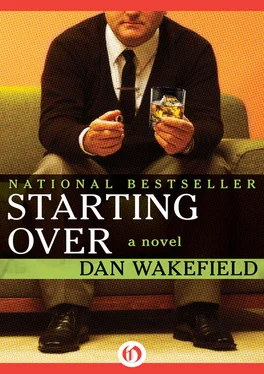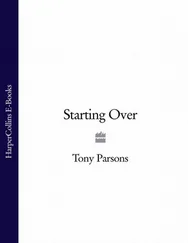Marilyn stroked his head, comfortingly, and said how glad she was that their relationship was rational, that they didn’t have to play those games with each other.
“It’s great,” he agreed. “It really is great.”
As a special treat, Potter invited Marilyn to come to his place for Sunday Brunch. On Saturday night they were going to have dinner with a married couple who were friends of Marilyn and go see Truffaut’s The Wild Child , and afterward to the Jazz Workshop on Boylston Street, where Stan Getz was appearing—a ghost, Potter felt, from his own collegiate past of Fifties cool. A real Night On The Town. After all that socializing Potter thought it would be nice if they could be alone together the next day, and so proposed to cook up a wonderful brunch of omelettes for just him and Marilyn. They would laze around and read the Sunday papers in cozy comfort.
Omelettes were the only thing Potter could cook, the only thing anyway that required “ingredients.” He could boil knockwurst and fry eggs and hamburgers, but the only thing he could really cook was an omelette. He learned during his marriage. In one of those periods when they both were Trying, Potter decided he would make a ritual of being the cook on Sunday. He studied Jessie’s Gourmet Cookbook, examining the diagrams of omelettes as well as the recipes, and practiced intently. The real moment of fulfillment came when he carefully flipped the heating face of the potion over on top of itself, with the goodies lying sequestered in between. He learned to make every kind of omelette, and delighted in inventing some of his own. He made up names for them. The one he made with leftover Chinese water-chestnuts and almonds in the center and lots of soy sauce on top was the Mao Tse-tung omelette. That sort of thing.
Jessica claimed to love them. She even ate all of her “Sweet Georgia Brown” omelette, which Potter had stuffed with canned peaches and cooked in brown sugar and brandy.
They always washed the omelettes down with a lot of chilled white wine, which helped a lot.
The omelette tradition lasted three or four months.
It was one of their better efforts.
“Can’t I help?” Marilyn asked when Potter was about to prepare the omelettes.
“No,” he said indignantly. “You have to go out in the living room and read the paper.”
“Well, I was just trying to be helpful.”
“I know,” Potter said, trying to control his temper. He kissed her on the nose. “The thing is, you’re supposed to just relax .”
She shrugged, and went to the living room.
Potter went busily about his preparations, but couldn’t help being a little annoyed that Marilyn wasn’t sitting back and reading the Sunday paper. She just smoked a cigarette and looked out the window, and occasionally paced around the room, like she was nervous.
Potter tried to concentrate on the omelettes. He was just doing cheese this time, nothing too fancy or outrageous. Just plain cheese omelettes, and a very nice chablis.
They ate in the living room, on the coffee table. Potter played a Vivaldi record. The sound of order, tradition. Sunlight streamed in the room, as if Potter had ordered it. He felt expansive.
“How’s that for an omelette?” Potter asked.
“Oh—it’s fine. Just fine. Really it is,” she said in an unconvincing abstract voice.
Potter wondered if he’d put too much Tabasco into the mix.
He swigged from his glass of chablis, and tried to concentrate again on his own omelette. It seemed quite fine to him, but you never knew about other people’s taste; some people simply liked things bland. A little too much Tabasco could put them off entirely.
Marilyn picked her way through about a third of her omelette, then put down her fork. There were tears in her eyes. Jesus. Potter knew he hadn’t put that much Tabasco into the thing.
“What is it?” he asked.
She shook her head. “Nothing.”
Potter took a deep breath, and exhaled very slowly. Trying for calm. He lit a cigarette. Marilyn wadded her paper napkin and dabbed at her eyes.
“I’m sorry,” she said.
“But why?” he asked gently. “Why are you sorry? Why are you sad? Isn’t everything OK?”
“Yes,” she sniffed. “It’s fine.”
“So?”
“So—I don’t know. I guess that’s it.”
“That everything’s fine?”
“Yes—I mean—no. It’s that it has to end, sooner or later. Sooner or later it won’t be fine. It’ll be lousy, and it’ll end.”
“Well, I guess everything has to end,” Potter said. “But Marilyn. For godsake. Why spoil the beginning by thinking about the end?”
“I don’t know,” she said. “I don’t mean to.”
They sat for a long time, while the music played on, and then finally it stopped and the needle slipped onto the black interior circle of the record, scratching.
Potter had to make himself lift off the arm of the player.
Marilyn blew her nose, and forced a smile. “I’m sorry,” she said.
“It’s OK, really it is.”
“No, it’s my fault for thinking that way.”
“Goddamn it, will you just forget about it!”
“You don’t have to yell at me!”
Potter closed his eyes, and breathed deeply. “I’m sorry,” he said.
“It’s OK. I’m sorry too.”
“OK,” he said.
“OK,” she said.
Potter decided that instead of meeting Marilyn after her Existentialism class Wednesday night, it might do both of them good if he just went out on his own, and he arranged to have a beer with Gafferty. The beer became many beers.
“Why is it,” Potter asked, “that a man and a woman can’t just get along?”
“Trouble in paradise, eh?”
In the first flush of his affair with Marilyn, Potter had told Gafferty he had found just the woman he was looking for.
“Nothing big, yet. Just the old warning signs.”
“Ah, well. Maybe it’ll all blow over. I’ve ridden out many a storm myself.”
“Jesus, I guess so. That must really be rough. I mean, with nine kids, you can’t just walk out.”
“Oh, you can take a walk all right, but you damn well better hike back pretty quick.”
“Jesus. I don’t see how—well, with me anyway, I don’t think I could take it.”
“Ah, well. We take what we get. And get what we ask for.”
“But why is it always so goddamn fucked up and complicated?”
“But man, why did we ever think it would be otherwise? Didn’t the Old Testament tell us? Didn’t the Greeks tell us? Haven’t all the wise folks down through history told us? Isn’t that what all art and philosophy and literature is about? The why is, why are we surprised?”
“Maybe it was going to movies and reading magazines,” Potter said. “At an impressionable age. Remember, when you and I were growing up the stories all had happy endings.”
“I was fortunate enough to be reading the Irish poets, even then.” He raised a finger for attention and recited:
All men live in suffering
I know as few can know,
Whether they take the high road,
Or stay content on the low.…
“Yeats,” he said.
“That’s your favorite, isn’t it?” Potter said. “Yeats.”
“Ah, he’s my man.”
“Is that who you did your thesis on?”
Gafferty’s head jerked back, as if Potter had taken a swing at him. “My thesis ,” he said.
“You know—your Ph.D.”
Gafferty let out a long breath. “Ah, you don’t know then.”
Gafferty belched, and called for another round.
The fifth round.
He explained to Potter how he had first tried to do his thesis on Yeats, then O’Casey, then Synge, failing each time, crossing the adviser each time because he couldn’t bring himself to treat his subjects with the required academic attitudes of distance and dissection. He kept writing lyric appreciations of the men and their work, which were judged to be “fine as far as they went” but they never went far enough into the sort of sterilized, surgical, symbol-seeking operations that were wanted.
Читать дальше












